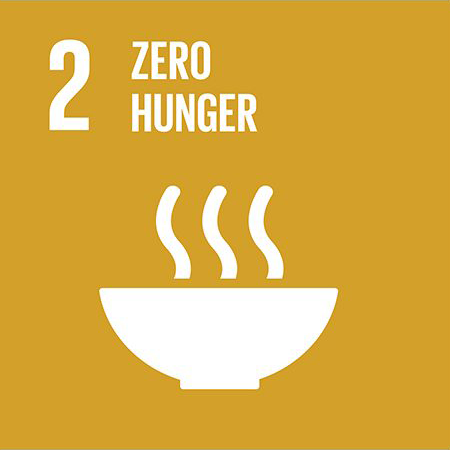
SDG 2: ZERO HUNGER
Being able to meet the nutritional needs of the world is a key element of sustainable development. Properly managed agriculture, forestry and fisheries can provide nutritious food for the whole community. Universities must be able to show how they contribute to solving hunger cases.
Achieve food security and nutrition that is far better than before and develop and ensure sustainable agricultural food production systems. This relates to other SGDs, as extreme hunger and malnutrition are obstacles to sustainable development. This is in line with SDG 8, namely decent work to reduce poverty and hunger.
Campus Food Waste
- Campus food waste tracking
- Total Food Waste
- Number of campus population
Padjadjaran University creates order, security, comfort, as well as safety, occupational health and the environment. There are regulations regarding the technical guidelines for order, security and safety of the Padjadjaran University campus environment.
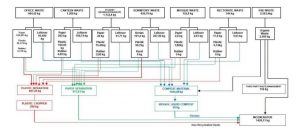
1. Technical Guidelines for Order, Security and Safety of the Padjadjaran University Campus Environment
Having an “Integrated Waste Management” design is a very positive thing for Padjadjaran University. Organic & non-organic waste is sorted and processed for destruction & elimination of waste odors with decomposer bacteria. The process after that is the process of composting, composting and packing. This makes the existing waste useful and makes the environment more protected.
( Technical Guidelines for Order, Security and Safety of the Padjadjaran University Campus Environment )
2. Unpad 3R Waste Management Concept
Unpad applies waste management with the 3R concept which refers to the Regulation of the Minister of Health of the Republic of Indonesia Number 3 of 2014 concerning community-based total sanitation; reduce, reuse and recycle. Based on data from the administration sector, the volume of waste generated from the Jatinangor and Dipati Ukur campuses is around 1 ton. It is estimated that the total waste that Unpad must process is around 30 tons. Consists of organic and inorganic waste such as paper, styrofoam, glass and plastic. Waste sorting at Unpad has now been carried out and is a simple first step of 3R activities. Generally, sorting can be done by type of waste; organic and inorganic. Organic waste includes food scraps from canteens and stalls, vegetables and other perishable waste. Inorganic waste generally consists of plastic, glass bottles, and cans. The potential for reuse of plastic waste needs to be increased through plastic waste sorting activities in the campus area. The main key to the success of this operation is the accuracy of waste disposal based on the existing containers. Accuracy is needed because every factor that speeds up sorting activities will save time and costs. If done correctly, almost 80% of Unpad’s academicians have carried out the sorting process, starting from students, lecturers, education staff to K3L officers.
This is the total of food (metric ton) that is discarded or lost uneaten by all catering services on campus
This is the sum of the FTE (Full Time Equivalent) number of students and the FTE number of employees
Student Hunger
- Student food insecurity and hunger
- Students and staff hunger interventions
- Sustainable food choices on campus
- Healthy and affordable food choices
Padjadjaran University is very concerned about food insecurity and student hunger. This is an important thing for Padjadjaran University to maintain goal 2 on the SDGs, namely No Hunger.
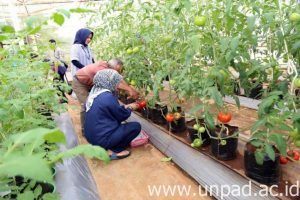
1. 2020 Nobel Peace Prize Recipients Prepare Strategies to Prevent Food Insecurity During the Pandemic in Indonesia
Food insecurity is one of the issues that surfaced during the Covid-19 pandemic in the world. This issue is a serious problem, considering that food insecurity is still a problem that plagued 55 countries in the world in 2019. The United Nations World Food Program (WFP), which concentrates on eradicating hunger in the world, has taken part in dealing with the impact of food insecurity due to the pandemic. Covid-19. WFP as the recipient of the 2020 Nobel Peace Prize has so far collaborated with 80 countries in the world in eradicating hunger. Indonesia is one of WFP’s working partners. However, on the other hand, the level of inequality in Indonesia is still high, so that the handling of food insecurity is still needed.
2. Unpad Supply Daily Logistics for Students Living in Dormitory on Campus
The Disaster Research Center of Padjadjaran University Response Division distributes logistical needs for students who live in dormitories on the Jatinangor campus (Bale Wilasa). In a release received by the Unpad Public Communication Office, it was stated that this logistical supply was carried out to maintain and reduce the social contacts of students in dormitories as face-to-face services on campus were closed. This supply was carried out in collaboration with the Unpad COVID-19 Task Force. Through the construction of a public kitchen in the dormitory area, the team distributes daily logistical needs in the form of food and medicine. Through the Unpad Siaga COVID-19 Donation Program, Unpad opened a collection of donations in terms of handling the Coronavirus. The donations opened included the provision of Personal Protective Equipment (PPE), student logistics, internet quota assistance for Bidikmisi students, provision of hand sanitizers, as well as for the development of the COVID-19 Self-Inspection Application (AMARI) made by a number of Unpad researchers.
( Unpad Supply Daily Logistics for Students Living in Dormitory on Campus )
3. Covid-19 Pandemic, Indonesia Must Be Ready to Realize Food Security and Independence
The existence of the Coronavirus (Covid-19) pandemic is attacking the world, one of which threatens food security. Therefore, it is time for every country to realize food security by referring to a sustainable agricultural system in accordance with the mandate of achieving the Sustainable Development Goals (SDGs).
( Covid-19 Pandemic, Indonesia Must Be Ready to Realize Food Security and Independence )
Padjadjaran University provides interventions to target hunger among students and staff such as supply and access to food banks/pantries.

1. Ahead of Ramadan, Unpad Distributes 1,957 Food Packages
Padjadjaran University distributed food packages to the community who participated in supporting the implementation of campus activities. Donations were collected from the leaders and managers of 17 faculties in Unpad. These basic food packages are given to people who have been active on campus, such as K3L staff, room cleaners, security guards, on-campus transportation drivers, motorcycle taxi drivers, and canteen administrators.
Provide sustainable food options for everyone on campus, including vegetarian and vegan meals.
1. Canteen Saridhona Unpad, Where to Eat All You Can, Pay Sincerely
There is a canteen located near the Bidikmisi student dormitory where these students are also financially constrained. Eat all you can and pay as much as you want to make this a very good thing for students and can apply long term and hopefully, this program can be sustainable.
( Canteen Saridhona Unpad, Where to Eat All You Can, Pay Sincerely )
Paying attention to healthy and affordable food choices is an important concentration of Padjadjaran University. Providing healthy and affordable food options for everyone on campus.

1. Logistics Service and Unpad Public Kitchen, Maintaining Energy During the Pandemic
Realizing that many students were affected by the social restriction policy due to Covid-19, Unpad through the Unpad Covid-19 Alert Task Force and the Disaster Research Center Response Division (PRK) immediately moved quickly. One of the responses given was the fulfillment of students’ logistical needs. Apart from being a provider of logistical needs for students who live inside and outside the Jatinangor campus area, this post is also a public kitchen to supply food for students.
( Logistics Service and Unpad Public Kitchen, Maintaining Energy During the Pandemic )
Proportion of graduates in agriculture and aquaculture
This is the total headcount number
of graduates at all levels from your institution in year 2019
This is the headcount number of
graduates at all levels who were studying
any aspect of food sustainability within
an agricultural and aquaculture course
and successfully completed the course in year 2019.
National Hunger
- Access to food security knowledge
- Events for local farmers and food producers
- University access to local farmers and food producers
- Sustainable food purchases
Padjadjaran University provides access to food security and sustainable agriculture and knowledge, skills or technology to farmers and local food producers.
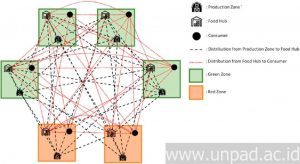
1. Unpad Researchers Create Effective Food Supply Chain Scenarios During a Pandemic
The Covid-19 pandemic has had an impact on several aspects, including causing uncertainty in the amount of demand and supply in the food supply chain. To overcome these problems, the Padjadjaran University research team researched alternative decision-making related to the food supply chain. This team assessed the need to develop a reliable sustainable food supply chain system. One effective strategy that can be implemented is to develop a regional food hub or Regional Food Hub (RFH). RFH is a facility that collaborates with local and regional producers, aggregators, and distributors such as wholesalers, supermarkets, as well as hotel, restaurant and catering groups (Horeka). Although RFH research has been carried out in various countries, there are still few studies involving determining the location of RFH development and food distribution networks in various conditions, especially during a pandemic. The results show that optimal conditions are obtained for the three scenarios. Research has obtained optimal RFH locations along with food distribution networks.
( Unpad Researchers Create Effective Food Supply Chain Scenarios During a Pandemic )
By providing events for local farmers and food producers to connect and transfer knowledge.
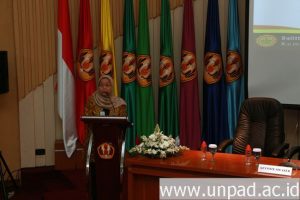
1. Achieving National Food Security, Livestock Need Applicative Technology
Applicative technology in the livestock sector has a role in encouraging the achievement of national food security. Said Dr. Atien, applicable livestock technology must be able to encourage the productivity of the upstream livestock sector through the application and investment of accurate cutting-edge technology. This is also in accordance with developments in the industrial era 4.0. The 10th National Seminar on Sustainable Livestock was officially opened by the Dean of the Faculty of Animal Science Unpad Prof. Dr. Ir. Husmy Yurmiati, M.S raised the theme “The Role of Applicative Livestock Technology in Accelerating the Achievement of SDGs and the Role of Universities in Community Empowerment”. At the event, there was also the launch of Media Contact for Livestock Farmers, Fapet Unpad. Meanwhile, the Chairman of the Committee, Diky Ramdani, M.Anim.St., Ph.D. said that a total of 78 papers were presented at the seminar, consisting of research papers and community service. A total of 60 papers were presented orally and 18 papers were presented through posters.
( Achieving National Food Security, Livestock Need Applicative Technology )
Provide access to university facilities (eg laboratories, technology, crop stocks) to local farmers and food producers to improve sustainable farming practices.
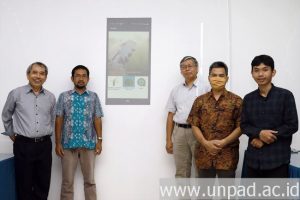
1. Unpad Academics Create an Application to Determine the Quality of Rice Plants Through Smartphones
Rice is the main food commodity in almost all parts of Indonesia because it is a staple food commodity. Rice productivity can be an indicator of food self-sufficiency in Indonesia. The innovation that was developed called “Decision Support System (DSS) Padi” is an application on an Android-based smartphone that makes it easier for farmers and PPLs to identify the adequacy of nitrogen fertilizers and blast and brown spot disease attacks on rice plants. This application was developed by a team of lecturers and students from the Faculty of Agricultural Industrial Technology and the Faculty of Agriculture Unpad. The Paddy DSS is more practical and accurate than the identification tool that has been used so far in the field, namely the Leaf Color Chart (BWD). This application is the result of the first year of a three-year research program entitled Design of An Online Decision Support System for Wetland Rice Production. Through the DSS Padi application, farmers and PPLs can practically identify rice plants using their respective cellphones.
( Unpad Academics Create an Application to Determine the Quality of Rice Plants Through Smartphones )
Prioritise purchase of products from local, sustainable sources.

1. FTIP UNPAD Students Have Successfully Developed Instant Powder Ready to Bread from Original Cilembu Sweet Sumedang
Three Food Technology students, Faculty of Agricultural Industrial Technology, Universitas Padjadjaran succeeded in developing instant powder (instant powder) made from sweet potato. This instant cilembu sweet potato powder is made from small waste cilembu sweet potato that is not sold in the market and is usually only used as animal feed. “We claim HUI BOO as a product that has a big impact because apart from being used from leftover cilembu sweet potato which is considered as waste and has no selling value, the innovation of powdering it into instant powder makes it have a longer shelf life when compared to cilembu sweet potato which is consumed by fire in general. easy to consume anytime and anywhere because it only needs to be brewed.” Greg said as in a release received by the Unpad Public Communication Office.
